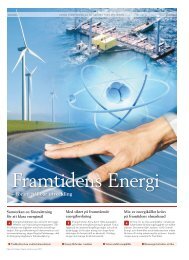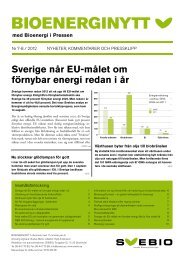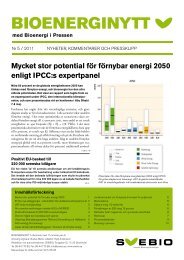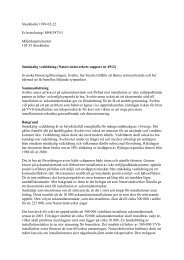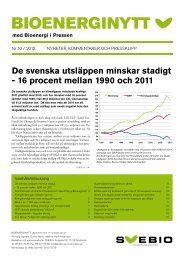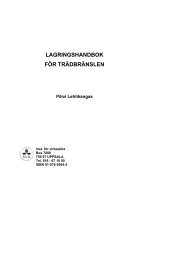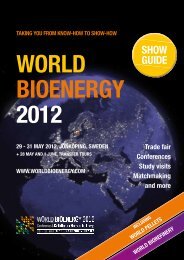Proceedings World Bioenergy 2010
Proceedings World Bioenergy 2010
Proceedings World Bioenergy 2010
Create successful ePaper yourself
Turn your PDF publications into a flip-book with our unique Google optimized e-Paper software.
52 world bioenergy <strong>2010</strong><br />
CLIMATE CHANGE IN BRAZIL: PUBLIC POLICIES, POLITICAL AGENDA AND MEDIA<br />
Magda Adelaide Lombardo; Ruimar Costa Freitas<br />
Universidade Estadual Paulista (UNESP) / Universidade de São Paulo (USP)<br />
Av. 24A, nº 1515, Bela Vista, 14506-900 Rio Claro – SP /<br />
Av. Prof. Lineu Prestes 338. Cidade Universitária, 05508-000 São Paulo- SP<br />
ABSTRACT: The climate change and sustainable development issue, especially in the context of energy production, have<br />
been on the current national policy rhetoric, reflecting the focus of the issue on the world scenario. The Brazilian Agroenergy<br />
Plan (2006-2011), considered as an strategic action of the federal government, is an attempt to organize a propose for<br />
Research, Development, Innovation and Technology Transfer, aiming to grant sustainability, competitiveness and greater<br />
equity between the agroenergy chain agents, starting with the reality analysis and future perspectives for the world energetic<br />
matrix. In this context, this research seeks to analyze the proposals of the State of São Paulo to the laws implementations that<br />
allows the goal accomplishment of 20% reduction on the greenhouse effect emissions until 2020 (base 2005), through action<br />
to the deforestation control, creation of an adaptation fund, establishment of a sustainable transportation system, mapping the<br />
vulnerabilities of the territory and financial mechanisms to the development of a low carbon economy. From the perspective<br />
of the national media coverage agenda, that has extensively approached the climate changes theme, this research collaborates<br />
to the analysis of sustainable projects inside the Brazilian perspective and context. This research will emphasize the relation<br />
between media, political speech and public policies.<br />
Keywords: Climate Change, Brazil, São Paulo, Public Policies, Political Agenda, Media, sustainability<br />
1 INTRODUCTION<br />
The world lives a crisis that may be unprecedented,<br />
regarding changes in the global climate. Although the<br />
causes and accountabilities had not been fully understood<br />
by the scientific community, the consequences of these<br />
changes no longer can be ignored.<br />
Until now, the main concern of the global community<br />
was development. However, in this new context,<br />
development cannot be considered without sustainability<br />
due to the impacts of inadequate anthropic intervention in<br />
the environment associated with reckless use of natural<br />
resources and concentration of the populations in urban<br />
centers. The concentration of the populations itself in<br />
relatively small amounts of land makes them more<br />
susceptible to natural catastrophes and the improper<br />
occupation and use of the soil in the urban areas and its<br />
adjacencies escalates the threats.<br />
The world energetic matrix, based on nonrenewable<br />
sources, drives the world to a new paradigm: the need to<br />
seek sustainability. It has also been driven by the concern<br />
that carbon dioxide emissions from the burn of fossil<br />
fuels affects the world climate, accelerating and<br />
intensifying natural warming and cooling cycles.<br />
The efforts worldwide to mitigation and adaptation to<br />
the new reality and foreseen future, have its main player<br />
in governments, which are looked after for an agenda that<br />
balances the need to sustainability with the quest for<br />
development. The role of governments in the market and<br />
social arena are present through many prisms<br />
(interventionist, minimum state… and so on) but we can<br />
considerer that, in the end, the main role of any State<br />
should be to orientate society and markets in all areas<br />
through incentives and/or restrictions to meet the needs<br />
and goals of communities.<br />
Nation-states, remain reluctant to assume early<br />
mitigation measures to climate change, making the<br />
international arena a complex and intricate path to the<br />
convergence of climate-friendly initiatives, but although<br />
local and regional initiatives have been proven to be more<br />
often easier to be taken, the international efforts still<br />
seeks agreements with sovereign states, denying space in<br />
the international agenda for local and regional initiatives.<br />
Seems the working logic goes with efforts that grow from<br />
the local/regional to national and global.<br />
Boykoff (2007) [1] states that research has pointed to<br />
the fact that the media content powerfully manipulate the<br />
translation between climate science, policy and public.<br />
Bennet (apud Boykoff, 2007) adds by saying that few<br />
things are as integral part of our lives as the news, so, that<br />
turned into a kind of a snapshot file of the pace, progress,<br />
problems and hopes of society. He also says that<br />
scientists tend to qualify their findings in light of the<br />
uncertainties that pervade their research. For journalists<br />
and political actors, these issues involving precaution,<br />
probability and uncertainty are all difficult to translate in<br />
a fluid, firm and unequivocal commentary, often valued<br />
in the context of communication and decision making.<br />
McBean and Hengeveld (2000) [2] argue that often<br />
the government’s response to the perceived risk of threat<br />
are often based on individual assessment and/or<br />
collective probability of exposure to danger, and the<br />
economic and social consequences of such exposure. It<br />
should be noted that, generally, these assessments are<br />
built from data supplied by the scientific community and<br />
translated by the media.<br />
Closer one is to the problem, more motivated it will<br />
be to participate in solutions and easier will be to<br />
implement actions that wouldn’t be considered in a larger<br />
scale scenario. That is why the working logic of solutions<br />
to mitigate and adapt to climate change should be<br />
considered from the local to the global and there is no<br />
way any real change is possible in the community<br />
without the enrollment of the community itself, and one



